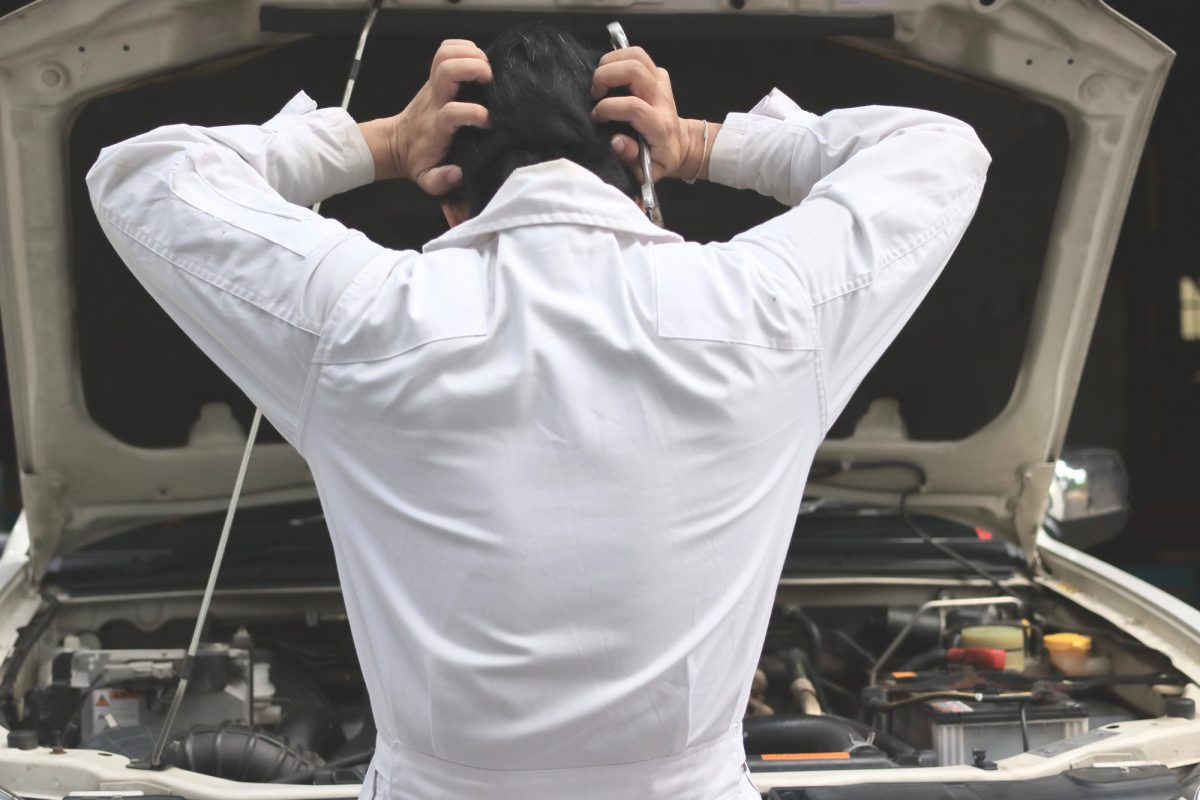Overloading your car might not seem like a big deal in the moment, but the consequences can sneak up on you faster than you’d expect. From tire blowouts to transmission damage, an overburdened vehicle is silently being pushed beyond its limits. While many drivers assume a few extra items won’t hurt, exceeding your car’s load capacity can lead to performance issues and safety hazards. Knowing the warning signs not only helps prevent long-term damage but also keeps you safe behind the wheel.
Your Car Sags in the Back

When your rear suspension sits lower than usual, especially compared to the front, it’s a strong indicator that the load in your vehicle is too heavy. This causes your shocks and struts to compress excessively, reducing their ability to absorb road impact and increasing wear. Redistribute heavy items toward the center of the car or remove unnecessary weight altogether to maintain a proper stance.
Tires Appear Flattened or Bulging

When tires appear squashed at the bottom or develop noticeable bulges on the sidewalls, they are likely being pushed beyond their safe load capacity. This increases the chance of overheating and blowouts, especially during long drives or in hot weather. Regularly inspect your tires and refer to your vehicle’s manual for load ratings to prevent overexertion.
Suspension Noises When Driving

A car that’s carrying too much weight may begin to emit creaking, groaning, or knocking sounds from the suspension area, particularly when going over bumps. These noises are signs that your shocks or struts are straining under pressure and could be nearing failure. Lighten your load immediately and consider having your suspension system professionally evaluated.
Your Car Bottoms Out Easily

If your car scrapes the ground when navigating speed bumps, dips, or driveways, it means your ground clearance has been compromised. This typically happens when the suspension is compressed beyond its safe range due to overloading. Unload unnecessary items and try to keep your cargo low and evenly distributed across the vehicle.
Related: 10 Genius Motorcycle Gadgets You’ll Wish You Had Sooner
Difficulty Accelerating

An overloaded vehicle demands more power to get up to speed, which puts significant strain on the engine and transmission. As a result, your car may feel sluggish, hesitate when you hit the gas, or struggle on inclines. Offloading heavy items can quickly restore performance and reduce engine wear.
Related: Car Prices Are Changing Forever And Here’s What No One Is Telling You
Engine Overheating More Often

Heavy loads make your engine work harder, especially in warm conditions or during extended travel, which can cause the temperature gauge to rise faster than usual. An overheating engine is not only inconvenient but can also lead to serious damage if ignored. To prevent this, keep the load manageable and make sure your cooling system is functioning optimally.
Related: The Next Oil Crisis Is Coming, Here’s What It Means for Your Wallet
Warning Lights on the Dashboard

Dashboard alerts like ABS, TPMS (tire pressure monitoring system), or the check engine light can be triggered by systems under pressure from excess weight. These lights act as early warnings that something is off, often related to vehicle balance, suspension, or drivetrain strain. Stop, assess the situation, and reduce your cargo before continuing your journey.
Related: 13 Shocking Reasons Hydrogen Cars Could Crush EVs Sooner Than You Think
Wobbling or Unsteady Ride

An unbalanced or overloaded vehicle often feels unstable, particularly when turning or during high-speed lane changes. This instability can be due to uneven weight distribution or a raised center of gravity, both of which can compromise safety. Reorganize your cargo and avoid stacking items too high to keep the car grounded.
Related: 12 Reasons Classic Cars Might Be Banned Sooner Than You Think and What This Means for Collectors
Smell of Burning or Hot Rubber

A strong burning odor coming from your tires or engine bay could indicate components are overheating due to overwork. Overloading causes friction in tires and excess heat in your engine or transmission, which can lead to premature failure. Stop the car immediately, unload excess items, and let the vehicle cool down before moving forward.
Related: 10 Classic Cars To Invest Before Prices Go Insane That Could Make You Rich
Difficulty Going Uphill

Cars that are overloaded often struggle with elevation changes, making climbing hills feel like a battle. You might notice the engine revving loudly, slower speeds, or even the transmission downshifting frequently just to keep up. Lightening the load restores power and prevents long-term damage to the drivetrain.
Related: 12 Shocking Ways Netflix, YouTube, And Spotify Are Fighting For Your Dashboard
Ignoring the signs of an overloaded car can lead to a cascade of problems that affect everything from performance to safety. What seems like a harmless extra bag or two could shorten your vehicle’s lifespan and put you at risk on the road. Understanding these red flags helps you make smarter, safer decisions every time you drive. By maintaining a balanced load and respecting your vehicle’s limits, you protect both your car and the people in it. Drive light, drive smart, and keep your wheels turning without trouble.
Disclaimer: This list is solely the author’s opinion based on research and publicly available information.
15 Insanely Complicated Cars That Mechanics Avoid

Some cars are known for their exceptional engineering, but that doesn’t always translate to easy maintenance. Certain models come with intricate technology, unusual designs, or parts that require specialized tools and knowledge, making mechanics think twice before working on them. These vehicles often lead to frustration, extended repair times, and sky-high service bills, making even the most experienced professionals avoid them.
Read it here: 15 Insanely Complicated Cars That Mechanics Avoid
12 Car Repairs Mechanics Don’t Want You to Know

Maintaining your car doesn’t have to be intimidating or expensive. With just a few basic tools and a little know-how, you can handle a surprising amount of car maintenance yourself. Whether it’s changing fluids, checking tire pressure, or replacing filters, these simple DIY tasks can keep your car running smoothly and save you money. Here are 13 maintenance tips that even total beginners can manage!
Read it here: 12 Car Repairs Mechanics Don’t Want You to Know
Rookie Truck Driver Mistakes That Could Cost You Big Time

Starting a career as a truck driver is exciting, but it comes with a steep learning curve that can lead to costly mistakes. Many new drivers underestimate the challenges of the job, from managing their time effectively to understanding the nuances of vehicle maintenance. Without proper guidance and experience, small errors can quickly escalate into major problems that affect safety, finances, and career progression. Avoiding these rookie mistakes is crucial for ensuring a smooth, successful journey on the road.
Read it here: Rookie Truck Driver Mistakes That Could Cost You Big Time
You’ll love these related posts:
- Mechanics Hate These 15 Tricks To Keep Your Motorcycle Running Like New
- 12 Weird Ways Your Car Reveals More About You Than You Think
- 11 Car Colors and What They Secretly Reveal About You
- If You Work In The Auto Industry Read This Now – 11 Bold Predictions About Your Future
- What Your Motorcycle Really Says About You Might Surprise You


